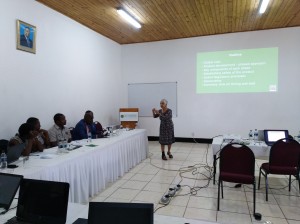Programme for Biosafety Systems (PBS) in collaboration with National Commission for Science and Technology (NCST) conducted a Food and Feed Safety Workshop to discuss formulation of food and feed safety guidelines for the assessment of Genetically Modified (GM) crops and how to raise awareness on safety of GM foods and feed for human and livestock consumption.
 The two day meeting was held at Sunbird Livingstonia Beach Hotel from 4th-5th July, 2019.
The two day meeting was held at Sunbird Livingstonia Beach Hotel from 4th-5th July, 2019.
In his opening remarks, NCST Director General Mr Anthony Muyepa pointed out the great strides that Malawi has made towards Biotechnology and Biosafety development. GM Crop trials have been conducted on various crops like cotton, cowpea and banana. Bt Cotton commercialization has recently been approved following a series of field trials which started in 2012 to assess the crop’s performance under farmer’s conditions. The crop has done well in yield and disease resistance capabilities.
Notably, Malawi is among the few African countries which has embraced the use of biotechnology to enhance agricultural production in an effort to attain food security for the ever-growing population and the Government of Malawi through NCST promotes the use of Biotechnology to address poverty, hunger, disease and enhance Malawi’s future development and economic growth.
However since Malawi does not have a legal framework for testing safety of GMOs, participants agreed to form a task force that will oversee formulation of the Food and Feed Safety guidelines with guidance from PBS international experts . Furthermore, the PBS Biosafety Advisor, Dr. Rashmi Nair gave presentations on phases of GM product development, global regulatory approval process for GM crops prior to commercialisation, codex standards and components of a dossier. She further emphasized on the need for political will as one of the most important factors in getting technologies approved. She also said it is very crucial for a country to have an Insect Resistance Management (IRM) framework.
A presentation on effective communication approaches by Dr Changadeya from Chancellor College, tackled the issue of public scepticism. Participants discussed various ways in which they can raise awareness among general consumers about the benefits of GM technology including; getting to know the target audience, empathy, creativity and building trust.
Other presentations made by national experts in various fields included : Challenges for improving Agriculture Productivity in Malawi and Potential use of GM Technology by Professor James Bokosi from Lilongwe University of Agriculture and Natural Resources (LUANAR)
• Risk Assessments pertaining to Food and Feed Safety by Dr. Lilian Chmphepo, the Biosafety Registrar at Environmental affairs Department.
• Legal and Institutional Framework in Malawi in Relation to Food and Feed safety by Victoria Kachimera from Environmental Affairs Department.
• Towards developing a guidance document for assessing food and feed safety of a GM crop in Malawi by Malawi Bureau of Standards (MBS) Deputy Director of Standards – Food and Agriculture, Elizabeth Kunje.
• Terms of Reference (TORs) for the development of the guidance document for assessing food and feed safety of a genetically modified crop in Malawi by Victoria Kachimera from Environmental Affairs Department.